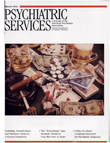Documenting informed consent for treatment with neuroleptics: an alternative to the consent form
Abstract
Clinicians can comply with Ohio state regulations for documenting patients' informed consent for treatment with neuroleptic medication by checking a box in the medical record stating that a periodic discussion of informed consent has occurred and writing a note about the discussion in the narrative record. The authors discuss clinicians' experience with this alternative to the conventional consent form in a large community support agency. Although the approach has been largely successful, implementation has been hindered by some clinicians' incomplete understanding of the informed consent process. Continued training is needed to bring the ideal of informed consent into clinical practice.
Access content
To read the fulltext, please use one of the options below to sign in or purchase access.- Personal login
- Institutional Login
- Sign in via OpenAthens
- Register for access
-
Please login/register if you wish to pair your device and check access availability.
Not a subscriber?
PsychiatryOnline subscription options offer access to the DSM-5 library, books, journals, CME, and patient resources. This all-in-one virtual library provides psychiatrists and mental health professionals with key resources for diagnosis, treatment, research, and professional development.
Need more help? PsychiatryOnline Customer Service may be reached by emailing [email protected] or by calling 800-368-5777 (in the U.S.) or 703-907-7322 (outside the U.S.).



